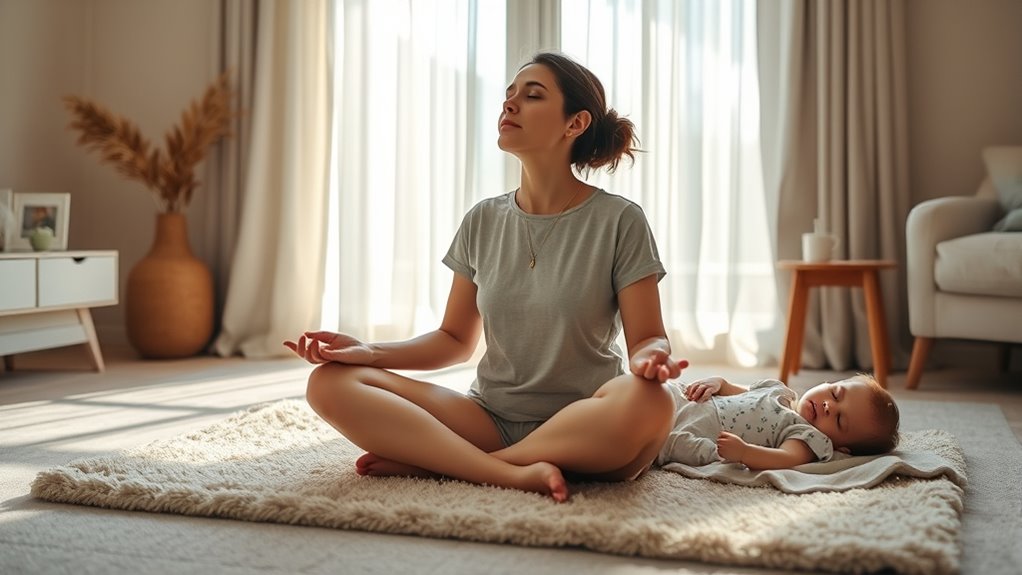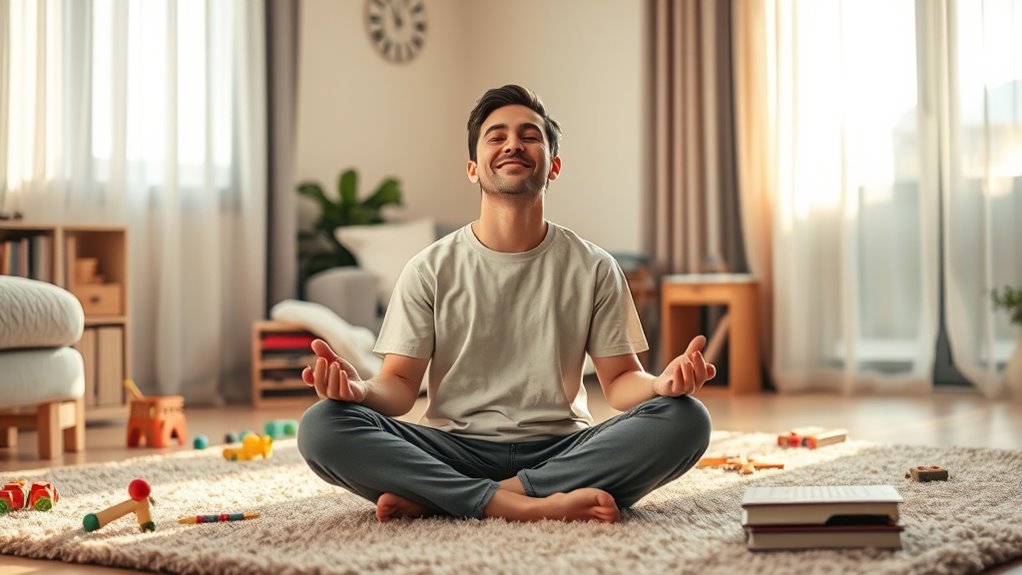Practicing meditation can help you find calm amid parenting chaos by providing a mental break and promoting emotional resilience. Just a few minutes of mindful breathing each day helps you stay present, reduce stress, and approach challenges with patience. It’s a simple way to recharge and gain clarity, preventing burnout and enhancing your ability to respond compassionately. Keep exploring, and you’ll discover ways to incorporate meditation seamlessly into your busy routine.
Key Takeaways
- Short, daily meditation sessions can help parents find calm and prevent burnout amid busy routines.
- Mindful breathing techniques improve emotional regulation and patience during stressful parenting moments.
- Integrating meditation into mornings or lunch breaks offers quick mental resets to handle chaos with clarity.
- Regular practice enhances resilience, reduces anxiety, and fosters a sense of inner peace despite daily challenges.
- Mindfulness encourages parents to enjoy moments with children more fully and respond calmly to everyday frustrations.

Have you ever felt overwhelmed by the constant demands of parenting? Juggling work, household chores, and caring for your children can leave you feeling drained and out of control. That’s where meditation can become a powerful tool to help you find some peace amidst the chaos. It’s not about escaping your responsibilities but rather about creating a space where you can recharge mentally and emotionally. When you incorporate meditation into your daily routine, you start balancing responsibilities more effectively. Instead of reacting impulsively to every sudden demand, you gain clarity and patience, which makes managing stress more manageable. Even just a few minutes of mindful breathing can shift your perspective, helping you approach challenges with a calmer mind. This practice encourages you to stay present, reducing feelings of being overwhelmed and preventing burnout.
Managing stress becomes easier as you develop a habit of quieting your mind. Meditation teaches you to observe your thoughts without judgment, which prevents stress from spiraling out of control. When you’re mindful, you begin to notice the physical signs of stress—tight shoulders, shallow breathing, or a racing heart—and you can gently intervene before those signs escalate. Over time, meditation helps you build resilience, so you’re better equipped to handle the daily ups and downs of parenting. It’s not about perfection; it’s about creating a moment of stillness in a busy day. You’ll find that even brief sessions can give you a renewed sense of calm and purpose, making it easier to face your responsibilities with patience and compassion. Incorporating practices like mindfulness can deepen your meditation experience and enhance your emotional regulation.
Incorporating meditation into your routine doesn’t mean you need hours of free time. Start small—just a few minutes each morning or during a lunch break. Focus on your breath, feel the air entering and leaving your body, and let your thoughts drift away like clouds. As you become more consistent, you’ll notice a shift in how you approach your role as a parent. Instead of feeling overwhelmed by the endless to-do list, you’ll develop a sense of steadiness that helps you stay grounded. Meditation nurtures your mental health, so you’re less likely to feel anxious or exhausted. It’s a simple yet powerful way to reclaim your inner peace, making it easier to enjoy the precious moments with your children and handle everyday responsibilities with a clearer, calmer mind.
Frequently Asked Questions
Can Meditation Improve My Parenting Skills?
Yes, meditation can improve your parenting skills. It helps you develop better emotional regulation, so you respond calmly during challenging moments. Regular practice also enhances parent-child bonding by increasing your patience and presence. When you meditate, you become more aware of your feelings and reactions, which allows you to create a more nurturing environment. Over time, this mindfulness fosters stronger connections and healthier interactions with your children.
How Do I Meditate With Young Children Around?
You can meditate with young children around by integrating mindful breathing into calming routines. Start by setting aside a few minutes during their nap or quiet time, encouraging them to join in with simple breathing exercises. Use calming routines like gentle singing or storytelling to create a peaceful atmosphere. Keep it flexible, patient, and fun, so your children learn to enjoy moments of stillness and mindfulness alongside you.
Is Meditation Suitable for Overwhelmed Parents?
Yes, meditation is suitable for overwhelmed parents. Studies show that just a few minutes of mindfulness benefits, like stress reduction and improved emotional regulation, can make a big difference. As a parent, you can practice short, focused sessions during nap times or breaks. It helps you stay present, manage stress, and find moments of calm amid chaos. Meditation fits easily into your busy schedule, providing essential mental clarity and resilience.
How Long Should I Meditate Daily as a Parent?
You should aim for at least 10 to 15 minutes of meditation daily, even if you’re busy. This helps you develop mindfulness techniques and manage meditation challenges more effectively. If you’re new, start with shorter sessions and gradually increase the duration. Consistency matters more than length, so find a routine that fits your schedule. Over time, this daily practice will bring more peace and clarity amidst your hectic parenting life.
Can Meditation Replace Therapy or Counseling?
Meditation can’t replace therapy or counseling, especially for deep emotional issues. However, it enhances mindfulness benefits and improves emotional regulation, helping you manage stress and stay centered. Regular meditation complements professional support by fostering mental clarity and resilience. Think of it as a valuable tool—not a substitute—that supports your emotional health while working with a therapist or counselor. Combining both gives you the best chance for overall well-being.
Conclusion
Remember, patience is a virtue, and taking time to meditate helps you find calm amid chaos. When you carve out moments of stillness, you equip yourself to handle parenting’s ups and downs with grace. Even on hectic days, a few deep breaths can restore your balance. By making meditation a regular habit, you’ll discover that peace isn’t just a distant dream but a daily reality. Keep practicing, and watch your patience grow stronger with every mindful breath.









